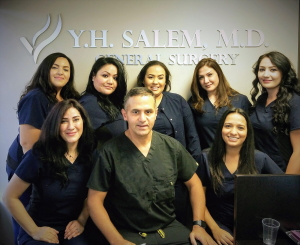Radiofrequency Ablation in Huntington Beach, California (CA)
Radiofrequency ablation (RFA) is the process of using focused radiofrequency waves to remove living tissue with heat, killing problematic cells in the process. Doctors use it to treat a wide range of medical conditions. Since the FDA approved Venefit (formerly known as VNUS Closure Procedure) in 1999, RFA has become a standard treatment for enlarged leg veins (such as varicose veins). The procedure usually takes between 45 minutes to an hour to perform, and your doctor can perform it in the office or an ambulatory surgery setting using localized anesthesia.
Before beginning your radiofrequency ablation procedure, your doctor will use ultrasound to map out the veins to be worked on. With clear direction from the ultrasound, your doctor will make a small incision or puncture near the knee and then thread a small catheter into the vein to be treated. Localized tumescent anesthesia (saline-infused anesthesia) will be injected into the vein to numb the area, firm up the area, and make it easier for the doctor to perform the ablation. When the entire vein to be treated has been canalized (fully threaded with the catheter), sound waves will be applied to heat and collapse the vein in segments, beginning from the top down as the catheter is pulled back and out of the vein through the incision. The collapsed vein will close (occlude) and scar up, and eventually it will be reabsorbed into the body. Your body will redirect the flow of blood away from the occluded vein and through healthier venous pathways.
Compression is vital to the healing process after any venous treatment. Compression reduces bruising, encourages circulation and reduces the risk of blood clots after a venous procedure. After your radiofrequency ablation procedure, your treated leg will be wrapped in compression bandages or stockings. Often your doctor will wrap your untreated leg as well. Your doctor will recommend that you wear compression stockings for a week or two following the procedure. You will be encouraged to walk immediately after the surgery, and you will be discouraged from bed rest and heavy lifting. You will most likely be able to resume normal daily activities within a day or two following the procedure. Be sure to schedule a follow-up appointment within three to seven days so your doctor can monitor your healing process and check for any complications.
Possible complications of radiofrequency ablation are temporary bruising, swelling and numbness. Skin burns are rare under the care of an experienced vein specialist. Sometimes patients are allergic to the anesthesia administered during the procedure. Patients report slightly less pain and bruising following radiofrequency ablation treatment than those who receive endovenous treatment.
Many insurance companies cover radiofrequency ablation with the same stipulations they would for any surgical procedure. Eligibility for radiofrequency ablation is usually determined by the extent of your varicose veins and your medical need.
Consult with a vein specialist in our directory today and determine if radiofrequency ablation is the right procedure for you.
About Yasser Salem M.D., F.A.C.S.
Varicose Veins MD Care
We specialize in different types of General and Vascular Surgeries and Procedures in the Foothill Ranch, Huntington Beach & Anaheim, CA areas. We are glad that you have chosen us to take care of your health problems, we will put a great effort in giving you a great experience with our office.
We are contracted with most health insurances which include PPO, HMO and Medicare/ Medical. We look forward to meeting you in person! Call or email us so we can get started in getting your appointment scheduled.
The Varicose Veins MD Care is a private medical facility, conveniently located in coastal town of Huntington Beach in Orange County, specializing in surgical and non-surgical treatment of varicose veins and venous conditions. The Varicose Veins MD Care delivers minimally invasive (or "pin-hole") surgery techniques. We are at the forefront of the advanced treatment of varicose veins and have both a national and international reputation for our work and innovation. We have now performed numerous minimally invasive procedures.
Our facility is equipped with the most advanced technology and the Varicose Veins MD Care staff are highly trained and compassionate individuals. Our physicians are board certified in their field of specialization and are committed to providing quality, safe care to our patients and their families by ensuring positive outcomes.
The Varicose Veins MD Care is a private medical facility, conveniently located in coastal town of Huntington Beach in Orange County, specializing in surgical and non-surgical treatment of varicose veins and venous conditions. The Varicose Veins MD Care delivers minimally invasive (or "pin-hole") surgery techniques. We are at the forefront of the advanced treatment of varicose veins and have both a national and international reputation for our work and innovation. We have now performed numerous minimally invasive procedures.
Our facility is equipped with the most advanced technology and the Varicose Veins MD Care staff are highly trained and compassionate individuals. Our physicians are board certified in their field of specialization and are committed to providing quality, safe care to our patients and their families by ensuring positive outcomes.
Featured Specialist for Radiofrequency Ablation in Huntington Beach, CA
Call Now: (714) 545-5200 8101 Newman Ave.Suite DHuntington Beach, CA 92647
Request Appointment
This form is currently unavailable.
We encourage you to call if you have questions or wish to setup an appointment.
We encourage you to call if you have questions or wish to setup an appointment.
More Services from Yasser Salem M.D., F.A.C.S.


